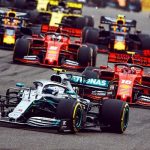Straight from the top We bumped into BMW’s Karl Viktor Schaller at Motorrad Days and couldn’t resist a natter with the man responsible for steering new model development…
FB: Is BMW likely to follow other brands down the supercharger route?
KV: It is obviously a very big question, but we’re absolutely not following that trend. We’ve seen the same approach in the car industry of downsizing an engine and supercharging it, but we need far better control on a motorcycle, so we need to be much more precise with the delivery. If you want to do that with a supercharged engine it’s very complicated, so you don’t get that swift reaction you’d expect from a regular motor. Also, you save weight when you downsize, but you gain weight on a supercharger, and if done properly you need an intercooler and so on. When you put this altogether, this high-engineered supercharged engine isn’t very beneficial compared to a normally aspirated motor.
FB: Are they something you’ve been testing?
KV: Yes, we have extreme experience in the car side of the business and we also know the downsides. You get a particular problem like a diesel engine, and with the upcoming emissions regulations, it’s impossible without certain filters and technology. In the future we will have to be compliant in the whole engine map and not just a part of the map, and usually bikes follow cars in between five to seven years so it’s not something we are looking at producing just yet.
FB: What about electric tech? Is that likely to become more prevalent in your range?
KV: The customer experience is the most important thing, and everyone knows what the brand of BMW can do. Even if something is electric, it has a chassis, it has brakes, it has suspension and it needs to have good dynamics which will stay the same. What’s hard is mass producing motorbikes in high quality; and when you look at a brand like Tesla, they have a great product but mass production is difficult. This will only get easier, but it takes time to develop. BMW was one of the first manufacturers to produce fully electric cars with the i3 as well. I’m confident we make good bikes and we know where we need to go.
But everyone has the same challenge with charging times and longevity. It’s a problem you have to look at from a slightly different perspective. If you remember the first days of mobile phones, you might have a Nokia 3210. It was fantastic, capable of doing nothing but calling, and could last almost a week on one charge. An iPhone today does everything, but needs charging twice a day. We now have diesel cars doing 1000km on one tank – which is the Nokia. Maybe in the future it will just be normal to charge your car or bike every day – like a modern phone. The point is we need the infrastructure, renewable energy and the will for people to accept change.
FB: Is there no plan for BMW to build an electric race bike for TT Zero?
KV: Not at the moment, no. You simply need to look at the volumes of the bikes on the market that have decent performance and decent range. They are all more than €30,000 and are going well, but it’s not our plan at the moment.
FB: We’re expecting a new S1000RR. Is there pressure to achieve class defining numbers over usability?
KV: It’s very simple – if we were to come again with the same horsepower figure but much more torque, our guys wouldn’t be very happy… even though usability is improved hugely. Back in the day we used to play a card game called Top Trumps, and it’s still the same game even now! Comparing to something like the Ducati figure is not right though as it’s 1,100cc, but it certainly won’t be far away…
Power figures play a very important role, but we hope to achieve the right number and deliver a bike that’s even more enjoyable and usable than our current version.
FB: Do you think there will ever be a resurgence of sub-litre sportsbikes?
KV: If you look into the Supersport market, it’s still shrinking so anything out of the litre class is unlikely to sell in significant numbers. I hope there will be a resurgence but it is unlikely. That being the case we consider the supersport market extremely important for the brand though, and although we make bikes for every area of the market, we’re just as focused on producing premium sportsbikes for our customers as we are all the other models, because it showcases who we are as a brand and what we can achieve. Performance is at the heart of BMW.
FB: Have you considered any new engine configurations? Triples, for instance?
KV: Triples are very good engines with great sound and behaviour, but with all the motorbikes, how many different engines do you need? Especially when we look at how many we already have in our range and how many millions of euros it takes to develop an engine. There’s nice brands on the market like Triumph doing this, so who else is needed? We are constantly looking and testing other options though.
BMW’s 9Cento suggests what’s next. Wanna see the future? Innovation’s key for BMW.

